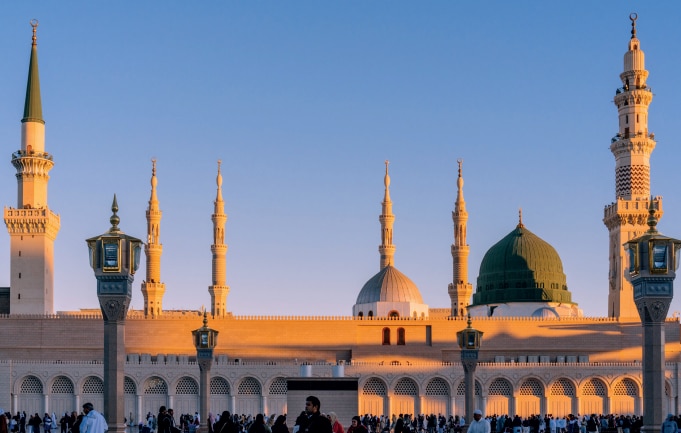
إِنَّ الدِّيْنَ بَدَأَ غَرِيْبًا وَيَرْجِعُ غَرِيْبًا فَطُوْبَى لِلْغُرَبَاءِ الَّذِيْنَ يُصْلِحُوْنَ مَا أَفْسَدَ النَّاسُ مِنْ بَعْدِيْ مِنْ سُنَّتِيْ
“Verily, Islam began as something strange and foreign [as it was new] and it will return to being strange and foreign [due to losing its original form], so blessed are the strangers who restore my sunnah which people after me had distorted.” (Jami‘ al-Tirmidhi, Kitab Tafsir al-Quran an Rasulillah, Hadith 3260)
In the above hadith, the Holy Prophet Muhammadsa foretold the decline of Islam while also praising a group of Muslims who would be seen as ghuraba (غُرَبَاءِ) – meaning a “minority”, “strangers” and “foreigners” (Al-Mu‘jam al-Jami‘)– in the eyes of other Muslims, but would be the flag-bearers of the revival of Islam and the sunnah of Prophet Muhammadsa.
One is bewildered by the eloquent subtlety the Holy Prophetsa used in his speech and how this subtleness was pregnant with deep meanings, serving as “signs for a people who reflect”. (Surah Yunus, Ch.10: V. 25)
In the wider Muslim world, there is hardly a group that is considered more “foreign” or “stranger” than Ahmadi Muslims. Ostracised by the Muslim world, they’re deemed to be “outsiders” and a fringe “minority”. The manufacturing of false propaganda and lies by Muslim ulema (scholars) against Islam Ahmadiyyat has, for over 133 years, created this misunderstanding, confusion and hatred towards us. We are at the point where even an elementary understanding of the beliefs of Islam Ahmadiyyat or the proofs of Hazrat Mirza Ghulam Ahmadas is almost non-existent amongst Muslims, who see Ahmadis and their beliefs – to use the words of the Holy Prophet Muhammadsa – as “strange” and “foreign”. A stark similarity to how early Muslims were perceived by opponents of Islam.
The word ghuraba (غُرَبَاءِ) has diverse meanings and from every angle; it points towards the mission of the Promised Messiahas. For example, we can take ghuraba غُرَبَاءِ to be a “minority’’ or “stranger” in the fact that good has become so rare that those who follow the sunnah are now in the minority, inadvertently making them strangers in a vice-ridden society.
In another context, the meaning of ghareeb غريب (singular of ghuraba غُرَبَاءِ) is one who is “homeless” or stateless (Al-Mu‘jam al-Jami‘). The history of Islam shows how early Muslims were persecuted and made homeless after their migration to Medina and even Ethiopia. The history of Islam’s revival – Ahmadiyyat – paints the same picture; even in our lifetime – for almost 40 years – the Khilafatul Masih has been living in exile. However, this homelessness ultimately brought the success of Islam from Medina.
Nonetheless, this minority group was given glad tidings by the Holy Prophetsa as they were to revive his sunnah. Of course, the first addressee of this hadith was the Promised Messiahas – who was of Persian descent (and therefore a non-Arab and a “foreigner”), and foretold (Jami‘ al-Tirmidhi) – and then his Khulafa who have been rectifying the distortion of Islam that the Holy Prophetsa spoke of.
For 114 years, Khilafat-e-Ahmadiyya has been the beacon through which this revival of Islam continues, and by representing the true Islam, Khilafat-e-Ahmadiyya and its followers have become “strangers” and “foreigners” to the wider Muslim ummah – both in numbers and in religious practice, as Ahmadis traverse the original path of the Holy Prophetsa.
Often people ask why Ahmadiyyat has not spread and become the majority, yet they have their answer in this beautiful hadith of the Prophetsa, for reformation – islah – takes generations, especially when you are to guide the world 180 degrees, towards the right path.
Hazrat Mirza Ghulam Ahmadas said:
“I came only to sow the seed which has been planted by my hand. It shall now grow and flourish and there is none who can hinder its growth.” (Tadhkiratush-Shahadatain, Ruhani Khazain, Vol. 20, p. 67)
For over a century, we have seen the tree of Islam’s revival growing under the shade of Khilafat. If it is “strange” and in the “minority” today, one day it will tower above all.

